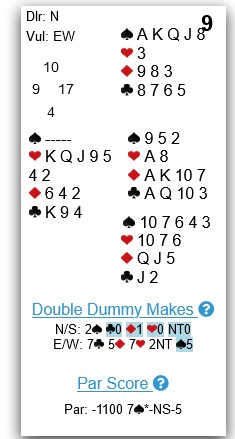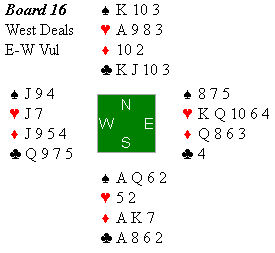Second flood. Continue reading
As I had done on nearly every Saturday for quite a few years, I played bridge with Peter Katz at the Hartford Bridge Club on April 6, 2024. I thought that we both played pretty well, especially against the best players, but we did not get a very good score. Part of that was due to a few hands that were bid very strangely by the opponents. The one that stood out for me was hand #9.
Peter and I were sitting East-West against Xenia Coulter and Nancy Calderbank. Xenia opened 2♠. I can understand why she did. She surely wants to bid, and the hand does not meet the rule of 20. Hers might be the only conceivable hand that I would bid with only ten points and only one five-card suit. I would not bid 2♠. I can think of many hands that would deliver ten tricks that I would pass opposite that bid, which could be made with only five points.
Peter, playing East, could not find a bid. Nancy for some reason decided to bid 3♠. I can see passing, and I can see bidding 4♠ to force the opponents to enter the bid at the five-level. I would never have bid 3♠.
In fact, I probably would have bid 5♠, the bid that the LAW of total tricks prescribes in this situation, assuming that North’s bid showed six spades. This bid would force one the opponents either to double a not-vulnerable contract or bid a slam with no idea of the partner’s holding.
If Nancy had passed, I would certainly have bid 3♥, and we would probably have found the slam. As it was, I did not have the temerity to enter the auction at the four-level. I passed, as did Xenia. Peter took a long time before he, too, passed. If Nancy had bid 4♠ or 5♠, I am sure that he would have doubled or bid notrump to show two places to play. In any of those cases my response would have been in hearts.
We ended up winning a lousy fifty match points on a hand that we were cold for a grand slam in either clubs or hearts.
So, only the combination of a peculiar opening bid and an inexplicable response left us tongue-tied. I guess that it was my fault. An old bridge aphorism states that one never preempts a preempt. In this case, however, the fact that both opponents showed spade length and some weakness maybe should have prompted me to think that I could count on Peter for four tricks. It was that kind of day.
When I arrived home from bridge I told Sue about the hand. She was surprised that it was legal to open Xenia’s hand at the two-level. I don’t know what she would have done instead. A pass certainly would be sinful with a hand that had the AKQJ of spades and a fifth one.
With this and other hands still on my mind I descended to the basement to spend some time watching MHZ Choice while using my rowing machine. I immediately noticed that there was a little bit of water on the floor in that corner of the basement. It wasn’t enough to be overly concerned about, but I resolved to tell Sue about it.
I watched the fifth episode of season 2 of The Bridge, a fictional police drama about a detective in Sweden who works with a detective in Denmark1, on MHZ Choice on my laptop. The reception was less than optimal. Because of repetitive delays for buffering it took forty-five minutes to watch the first half hour. Then I quit and went upstairs.
When I told Sue about the water in the basement, she asked if we had any leftover kitty litter. She suggested that we use it to absorb the water. I said that I was pretty sure that we did. I went back downstairs to check. The litter box and the box of litter were in the new part of the basement. When I opened the door between the two parts of the basement, I was surprised to see about an inch of water covering the entire floor of the new part.
It was time for supper. I resolved that early on Sunday morning I would repeat the laborious process that I did for the aftermath of Hurricane Ida in September of 2021. That effort is documented here with a good deal of detail and photos.
I got out of bed at about 2:00 a.m., found the extension cord and my wet-shoes, and filled ten barrels of the Sears equivalent of the Shop-Vac. The amount of water that I removed made almost no visible impact. I then went back to sleep.
On Sunday I opened the hatchway door on the northern side of the new basement at about noon. Fortunately the weather was clear and seasonably mild. I also filled another eighteen barrels. This was far less than my plan, but being two and half years older is very meaningful when one is in his mid-seventies. I was exhausted after four barrels, and both my lower back and the sides of my legs were aching.
I went back down and was pleasantly surprised to see that the level of the water was lower than I had left it on Sunday evening. After I had filled seven more barrels, there were still two small puddles, but I hoped that by Tuesday morning the dehumidifier and natural evaporation would seriously reduce or eliminate them.
My plan did not work. I filled two barrels on Tuesday morning. That cleared a path to the door, but it filled back in before I could leave. I did a barrel and a half on Tuesday afternoon. Some progress was made, but the two remaining areas, near the north wall and about twenty feet south of there were obviously going to fill back in with water.
On Wednesday I sucked up one full barrel and another perhaps one-third full. Because the hatch door was closed, I could not gauge my progress near the door. Most of the remaining water is along the north wall. It took another three days before I was able to suck up enough water for it to dry out completely.
I suspected that the water came from the depression beneath the deck outside of Sue’s bedroom. When the water table was exceptionally high water must have seeped in through the north wall and flowed downhill after that.
I swore more often this time than in 2021. I did not want to contemplate the possibility that flooding had become a repetitive occurrence. The weather in Connecticut seemed to have become much more tropical than in the previous decades. I did not miss the snow, but I have become too old to deal with the flooding. Also, the fact that I was continually obstructed by the mountains of useless junk in the basement turned my attitude bitter. I longed for an apartment and a landlord.
1. The two countries are connected by the Øresund Bridge that is almost five miles long.



